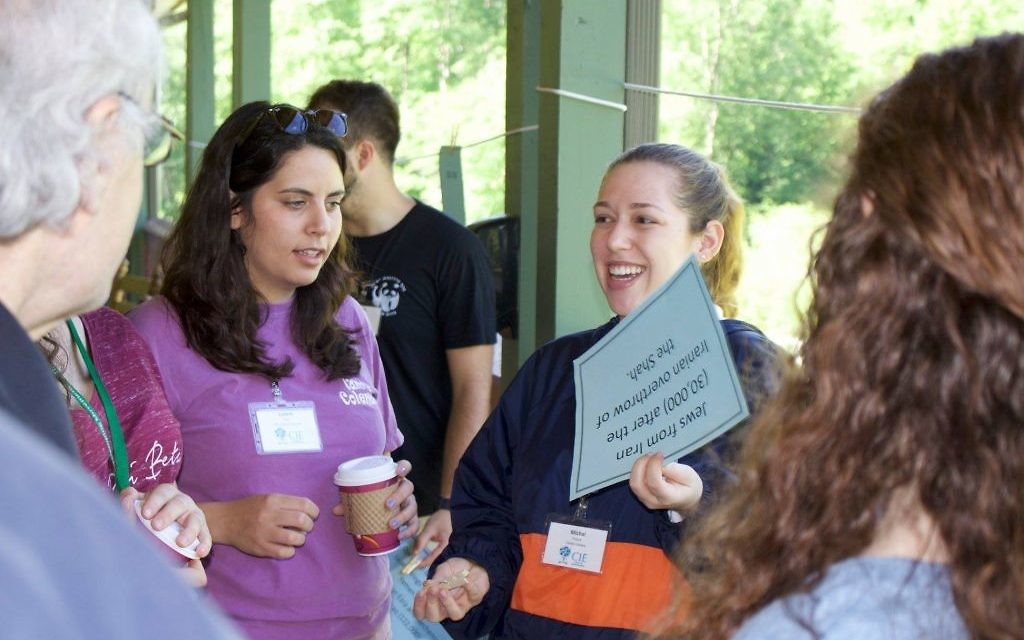Spring Training: Israel Content in Camp Context
The Center for Israel Education provides a three-day workshop for representatives of 12 summer camps.
The Center for Israel Education, with the cooperation of the Foundation for Jewish Camp, led a three-day Israel learning retreat in May for 35 overnight and day camp staffers, most of them either in college or recent college graduates.
Participants represented 12 U.S. summer camps that either were unaffiliated or were part of the URJ, Young Judaea and Ramah camping movements.
The three-day workshop focused on enhancing one of the most successful Jewish education models — summer camp — with historical, fact-based content and state-of-the-art, informal education methods.
Get The AJT Newsletter by email and never miss our top stories Free Sign Up
A beneficial result from working with these students is that they not only will use the information gleaned from our time with them, but also will return to campuses where their information base can be used in asserting Israel’s story.
Camps were invited to send cohorts of up to five staff members, including a member of the senior leadership team. Core funding for the retreat, held at Ramah Darom, came from a New York-based foundation that supports facilitating Israel identity in Jewish environments.
Content included the origins of Jewish identity, peoplehood, Zionism, state making and contemporary issues. We devoted time to implementing the content for camp experiential engagement. Each camp cohort spent time figuring out how its unique camp setting could infuse Israel into interactive, experiential educational programming.
We’re mindful of the longtime contributions of Israeli summer shlichim (emissaries) and know that a lot of North American camps have long incorporated elements of Israeli life, lore and culture into their camp programming. This workshop is about ramping up the content to be more than an Israel Day or an Israeli Scouts fire sign.
It is about giving the campers, through their staffers, important content about Israel that reaches far beyond front-page headlines and news bites. It is about building historical foundations that provide innovative ideas for engaging campers.
We did not shy away from questioning tough issues.
Recounting her experience at the retreat, Elana Pollack, the program director of Camp Judaea in Hendersonville, N.C., found the time a delightful interlude to what she normally does.
“As a full-time camp program director and part-time religious school teacher, I spend most of my time in camp leading and setting up the discussions rather than participating in them,” she said. “The seminar challenged me to think and respond in ways that I hadn’t in several years about topics that did not actually require my solution — oh, how refreshing as the summer camp season is upon me! After allowing myself to sit on the student side of the classroom, learning from the CIE staff and the impressive, young participants, I now feel more properly positioned to encourage these exercises and conversations in camp.”
CIE President Ken Stein said: “Some participants wrote feverishly, jotting down ideas from peers. Others challenged their own perceptions of Israel’s story, and still others figured out, through brisk exchanges, how to apply content to their camp’s settings. As a teacher, watching each of them belong to Israel’s story in their unique ways generated similar outcomes to what educators, teens and clergy have experienced in previous Israel learning sessions with us. Common to all of them is understanding content in context. By asking poignant questions, most realized that it is possible to concretize their attachments to Israel and still be critical where appropriate. It is all about substance and nuance.”
If you’re interested in having your camp participate in the program next summer or want to learn more about CIE’s Israel engagement work, contact me at steve@israeled.org, or visit www.israeled.org.
Steve Kerbel, an educational consultant in the Washington area, is the camp project director for the Center for Israel Education.





comments